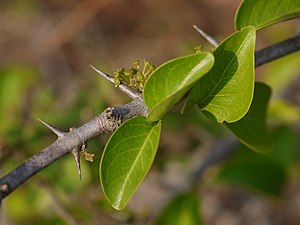Note: This is a project under development. The articles on this wiki are just being initiated and broadly incomplete. You can Help creating new pages.
Difference between revisions of "Canthium parviflorum"
| (6 intermediate revisions by the same user not shown) | |||
| Line 1: | Line 1: | ||
[[File:Canthium parviflorum (8582483478).jpg|thumb|right]] | [[File:Canthium parviflorum (8582483478).jpg|thumb|right]] | ||
| − | This plant is belongs to Rubeaceae family. | + | This plant is belongs to Rubeaceae family. It is a thorny shrub. |
==Uses== | ==Uses== | ||
| − | {{Uses|}}, {{Uses|}}, {{Uses| | + | {{Uses|Dysentry}}, {{Uses|Flux}}, {{Uses|Diabetes}}. |
==Parts Used== | ==Parts Used== | ||
| − | {{Parts Used|}}, {{Parts Used| | + | {{Parts Used|Stem}}, {{Parts Used|Leaves}}, {{Parts Used|Root}}. |
==Chemical Composition== | ==Chemical Composition== | ||
| − | <ref name="chemical composition"/> | + | Canthium parviflorum contains Polyphenols, Glutathione, and Flavonoids.<ref name="chemical composition"/> |
==Common names== | ==Common names== | ||
| − | {{Common names|sa=|en= | + | {{Common names|sa=Gangeruki|en=Canthium|hi=|kn=Kaare gida|ta=Kaaraichedi|te=Balusu chettu}}<ref name="Common names"/> |
==Properties== | ==Properties== | ||
| Line 63: | Line 63: | ||
==References== | ==References== | ||
| − | |||
<references> | <references> | ||
| − | <ref name="chemical composition">[ | + | <ref name="chemical composition">[Chemistry]</ref> |
| − | + | <ref name="Leaf">[Morphology]</ref> | |
| − | <ref name="Leaf">[" | + | <ref name="Common names">Karnataka Aushadhiya Sasyagalu By Dr.Maagadi R Gurudeva, Page no:87</ref> |
| − | + | <ref name="How to plant/cultivate">[Cultivation]</ref> | |
| − | <ref name="How to plant/cultivate">[ | ||
</references> | </references> | ||
Latest revision as of 11:38, 29 March 2021
This plant is belongs to Rubeaceae family. It is a thorny shrub.
Contents
- 1 Uses
- 2 Parts Used
- 3 Chemical Composition
- 4 Common names
- 5 Properties
- 6 Habit
- 7 Identification
- 8 List of Ayurvedic medicine in which the herb is used
- 9 Where to get the saplings
- 10 Mode of Propagation
- 11 How to plant/cultivate
- 12 Commonly seen growing in areas
- 13 Photo Gallery
- 14 References
- 15 External Links
Uses
Parts Used
Chemical Composition
Canthium parviflorum contains Polyphenols, Glutathione, and Flavonoids.[1]
Common names
| Language | Common name |
|---|---|
| Kannada | Kaare gida |
| Hindi | |
| Malayalam | NA |
| Tamil | Kaaraichedi |
| Telugu | Balusu chettu |
| Marathi | NA |
| Gujarathi | NA |
| Punjabi | NA |
| Kashmiri | NA |
| Sanskrit | Gangeruki |
| English | Canthium |
Properties
Reference: Dravya - Substance, Rasa - Taste, Guna - Qualities, Veerya - Potency, Vipaka - Post-digesion effect, Karma - Pharmacological activity, Prabhava - Therepeutics.
Dravya
Rasa
Guna
Veerya
Vipaka
Karma
Prabhava
Habit
[[:Category:Habit - |]]
Identification
Leaf
| Kind | Shape | Feature |
|---|---|---|
Flower
| Type | Size | Color and composition | Stamen | More information |
|---|---|---|---|---|
| {{{5}}} |
Fruit
| Type | Size | Mass | Appearance | Seeds | More information |
|---|---|---|---|---|---|
Other features
List of Ayurvedic medicine in which the herb is used
Where to get the saplings
Mode of Propagation
[[:Category:Index of Plants which can be propagated by |]]
How to plant/cultivate
Commonly seen growing in areas
[[:Category:Herbs that are commonly seen in the region of |]], [[:Category:Herbs that are commonly seen in the region of |]], [[:Category:Herbs that are commonly seen in the region of |]], [[:Category:Herbs that are commonly seen in the region of |]], [[:Category:Herbs that are commonly seen in the region of |]].
Photo Gallery
References
External Links
- [ ]
- [ ]
- [ ]
- Ayurvedic Herbs known to be helpful to treat Dysentry
- Ayurvedic Herbs known to be helpful to treat Flux
- Ayurvedic Herbs known to be helpful to treat Diabetes
- Herbs with Stem used in medicine
- Herbs with Leaves used in medicine
- Herbs with Root used in medicine
- Herbs with common name in Kannada
- Herbs with common name in Tamil
- Herbs with common name in Telugu
- Herbs with common name in Sanskrit
- Herbs with common name in English
- Habit -
- Index of Plants which can be propagated by
- Herbs that are commonly seen in the region of
- Herbs
- Pages without herbs images

